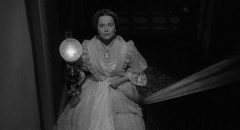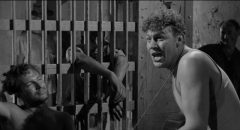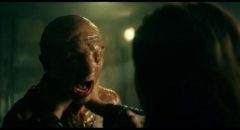
Criterion’s new Blu-ray offers a superb presentation of William Wyler’s greatest film, The Heiress (1949), a subtle yet scathing dissection of the ways in which money distorts and destroys human relationships.

A decidedly mixed bag of recent viewing; a pair of young adult zombie stories — the Maze Runner Trilogy (2014-18) and the small-scale The Girl with All the Gifts (2016); a taut ’50s prison escape noir (Crashout, 1955) and a polished new crime noir (Dragged Across Concrete, 2018); a minor, dull thriller (All the Devil’s Men, 2018); and a bloated, enervatingly pretentious remake of a genre classic (Suspiria, 2018).

A pair of recent Blu-rays from Shout! Factory bookend ’70s horror with John Hayes’ Grave of the Vampire (1972), a too-little-known cheap exploitation feature which revitalizes vampire mythology and William Girdler’s The Manitou (1978), a low-budget studio movie with a better-than-average cast which plays a variation on demonic possession but fails to find an effective tone.

The Criterion Collection presents a new 4K restoration of Elia Kazan’s best film, A Face in the Crowd (1957). The excellent image showcases two of the finest performances of the 1950s: Andy Griffith in his screen debut as the countryboy-turned-demagogue Lonesome Rhodes and Patricia Neal as the smalltown radio reporter who discovers him and facilitates his rise to national stardom.

Severin’s box set of Sergio Martino’s All the Colors of the Dark (1972) and Federico Caddeo’s documentary All the Colors of Giallo (2019) provides a masterclass in the poetically sordid Italian genre which flourished so briefly from the late 1960s to early 1980s. The collection of eighty-two giallo trailers with a four-hour commentary by Kat Ellinger are alone worth the price, but there’s a lot more – including two CDs of giallo scores and several informative interviews, as well as a supplementary disk which surveys the German krimi genre.

Indicator’s first box set of Hammer films on Blu-ray is an uneven selection of the studio’s mid-’60s output, including two of their best along with two of their weakest releases. Alongside Michael Carreras’ mediocre Maniac (1963) and The Curse of the Mummy’s Tomb (1964), we get The Gorgon (1964), on of Terence Fisher’s finest Gothic horrors along with Silvio Narizzano’s debut feature, Fanatic (1965, aka Die! Die! My Darling!), the best of Hammer’s psychological horrors, all sporting excellent transfers and informative special features.

Style trumps substance in several recently viewed movies: from Stefano Sollima’s troubling depiction of mythic threats on the U.S. southern border in Sicario: Day of the Soldado (2018) to Julius Avery’s disappointing exploitation of World War Two horrors for cheap thrills in Overlord (2018), from Drew Goddard’s ersatz Tarantino-like narrative play in Bad Times at the El Royale (2018) to Kenneth Branagh’s glossy rehash of Agatha Christie’s Murder on the Orient Express (2017).

Entertainment knows no bounds in terms of style or quality: recent viewing ranges from Walter Hill’s gripping Vietnam allegory Southern Comfort (1981) to Kinji Fukusaku’s pulp sci-fi The Green Slime (1968), from Richard Franklin’s Ozploitation horror Patrick (1978) to Robert Amram’s perplexing End Times “documentary” The Late Great Planet Earth (1979).

Indicator lavish attention on four less well-known, non-Gothic Hammer Films productions in their second box set devoted to the company: Criminal Intent focuses on a range of bad behaviour from murder to bank robbery and child molestation in four films which, while not all entirely successful, illuminate the studio’s versatility.